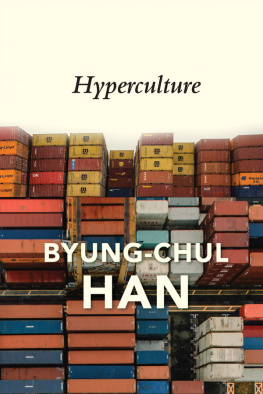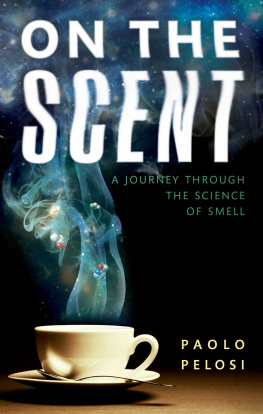Contents
Guide
Pages

Byung-Chul Han
The Scent of Time
A Philosophical Essay on the Art of Lingering
Translated by Daniel Steuer
polity
First published in German as Duft der Zeit. Ein philosophischer Essay zur Kunst des Verweilens transcript Verlag, Bielefeld, 2009
This translation is published by arrangement with transcript Verlag, Germany.
This English edition Polity Press, 2017
Polity Press
65 Bridge Street
Cambridge CB2 1UR, UK
Polity Press
101 Station Landing, Suite 300,
Medford, MA 02155, USA
All rights reserved. Except for the quotation of short passages for the purpose of criticism and review, no part of this publication may be reproduced, stored in a retrieval system or transmitted, in any form or by any means, electronic, mechanical, photocopying, recording or otherwise, without the prior permission of the publisher.
ISBN-13: 978-1-5095-1608-7
A catalogue record for this book is available from the British Library.
The publisher has used its best endeavours to ensure that the URLs for external websites referred to in this book are correct and active at the time of going to press. However, the publisher has no responsibility for the websites and can make no guarantee that a site will remain live or that the content is or will remain appropriate.
Every effort has been made to trace all copyright holders, but if any have been inadvertently overlooked the publisher will be pleased to include any necessary credits in any subsequent reprint or edition.
For further information on Polity, visit our website: politybooks.com
PREFACE
Todays temporal crisis is not a crisis of acceleration. The age of acceleration is already over. What we experience today as acceleration is only one of the symptoms of temporal dispersal. Todays temporal crisis is caused by a dyschronicity which leads to various temporal disturbances and irritations. Time is lacking a rhythm that would provide order, and thus it falls out of step. Dyschronicity lets time whizz, so to speak. The feeling that life is accelerating is really the experience of a time that is whizzing without a direction.
Dyschronicity is not the result of a push for further acceleration. In the first place, it is the atomization of time which is responsible for dyschronicity. It is also the reason for the feeling that time passes much more quickly than it used to. Due to the temporal dispersal, no experience of duration is possible. Nothing comports time.The atomization of life goes hand in hand with an atomization of identity. All we have is our self, our little ego. We are subject to a radical loss of space and time, even of world, of being-with. Poverty of world is a phenomenon of dyschronicity. It reduces the human being to a tiny body that is kept healthy at all costs. Otherwise, what would we have? The health of ones fragile body is a substitute for world and God. Nothing outlasts death. Thus, dying is particularly difficult today. And we age, without becoming old.
This book investigates the causes and symptoms of dyschronicity in historical as well as systematic terms. But it also offers reflections on possibilities for recovery. While these touch upon heterochronic or uchronic moments, the present study is not limited to finding and rehabilitating these exceptional, extraordinary places of duration. Rather, its retrospection draws attention to the prospective need for life to take on a different form, down to its everyday details, so that the temporal crisis can be averted. It will not mourn the passing of the time of storytelling. The end of narration, the end of history, does not need to bring about a temporal emptiness. Rather, it opens up the possibility of a life-time that can do without theology and teleology, but which possesses a scent of its own. But this presupposes a revitalization of the vita contemplativa.
Not the least cause for todays temporal crisis is the absolute value attached to the vita activa. This leads to an imperative to work, which degrades the human being into an animal laborans. The hyperkinesia of everyday life deprives human existence of all contemplative elements and of any capacity for lingering. It leads to a loss of world and time. So-called strategies of deceleration do not overcome this temporal crisis; they even cover up the actual problem. What is necessary is a revitalization of the vita contemplativa. The temporal crisis will only be overcome once the vita activa, in the midst of its crisis, again incorporates the vita contemplativa.
Notes
Transl. note:
Nichts verhlt
die Zeit. This unusual form of expression is an allusion to Heideggers use of comportment.
Non-Time
so that in the wavering moment
there should be something, at least, that endures.
Friedrich Hlderlin
Nietzsches ultimate man is remarkably relevant to our present times.before his time has come. Instead of dying, he comes to an end in non-time.
Whoever cannot die at the right time must perish in non-time. Dying implies that a life comes to its proper end; it is a lifes conclusion. If life is deprived of every form of meaningful closure, it will be ended in non-time. Dying is difficult in a world in which ending or completion has given way to a passing without end or direction, to a permanent state of being unfinished and beginning anew in a world, that is, in which individual lives do not terminate in a concrete form or totality, but in which the course of life ends abruptly in non-time.
A general inability to end and to conclude is also the cause of todays acceleration. Time is running off because it cannot find an end or conclusion, because it is not restrained by any temporal gravitational forces. Acceleration is an expression of the bursting of the temporal dam. There are no longer any dams that regulate, articulate or give a rhythm to the flow of time. There are no dams to hold or halt time by giving it something to hold on to hold in its exquisite double meaning. When time loses all rhythm, when it dissipates into the open without any hold or direction, then all right or good time also disappears.
Against perishing in non-time, Zarathustra invokes an altogether different kind of death: Many die too late and some die too early. Still the doctrine sounds strange: Die at the right time./ Die at the right time: thus Zarathustra teaches./ To be sure, he who never lived at the right time could hardly die at the right time! The possibility of Nietzsches free and consummating death, and of Heideggers Being-free for death, both depend on a temporal gravitation that ensures that the present is framed [umspannt], closed round, by the past and future. This temporal tension [temporale Spannungsverhltnis] removes the present from its passing without end or direction and infuses it with meaningfulness. The right time, or the right moment, only arises out of the temporal tension within a time that has a direction. In atomized time, by contrast, all temporal points are alike. Nothing distinguishes one point in time from another. The decay of time disperses dying into perishing. Death puts an end to life, life as a directionless sequence of present moments, and it does so in non-time. This is the reason why dying is particularly difficult today. Nietzsche, like Heidegger, opposes the decay of time which de-temporalizes death and turns it into a perishing in non-time:













